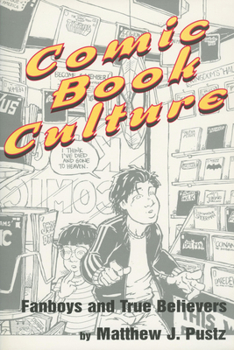Comic Book Culture: Fanboys and True Believers
Select Format
Select Condition 
Book Overview
What are super-devoted fans of comic books really like? What draws them together and energizes their zeal? What do the denizens of this pop-culture world have in common? This book provides good answers as it scrutinizes the fans whose profiles can be traced at their conventions, in pages of fanzines, on websites, in chat-rooms, on electronic bulletin boards, and before the racks in comic bookstores. They are a singular breed, and an absorbing...
Format:Paperback
Language:English
ISBN:1578062012
ISBN13:9781578062010
Release Date:January 2000
Publisher:University Press of Mississippi
Length:260 Pages
Weight:0.84 lbs.
Dimensions:0.7" x 6.1" x 9.2"
Customer Reviews
3 ratings
A good start for understanding
Published by Thriftbooks.com User , 21 years ago
I'm using this book in my college writing course ("text+vision") this semester, and it is exactly what I wanted from a cultural overview of comic book fandom. Pustz does a great job of explaining how fandom came about, how it compares to other cultures (with a consistent reference to baseball fans, for example), and some of its peculiarities. In particular, he is able to partly explain the incestual nature of consumer and producers in comics, where each is a responsible party to the worst excesses of the medium, yet Pustz is careful to not make a judgment statement about this (unlike me).This book is not a history of comics, of who published what first and which creator sued which publisher. For that, you should check out Bradford Wright's Comic Book Nation. It's not even a history of comics fandom, although it does gather quite a bit of that together in its pages (Bill Schelly covers the history of fandom in more detail). What Pustz tries to cover is the area inbetween--where fans and publishers met. This is the culture of comic books, the place where the two groups make something together, and at first it may seem strange to think of consumers as producers, or producers as consumers. But, through his analysis of comics letters pages and fanzines, Pustz shows how the two groups affected each other.Comic Book Culture is copyright 1999, but feels like it was written in 1996 or 1997, mainly for the lack of focus on the incredible growth of manga in America and how Pokemon, DragonBall Z, and Sailor Moon are revitalizing comic book culture by bringing children back to comics. The last three years have also increased the importance of the Internet on the culture, which Pustz talks about briefly in the chapter 5. Finally, he really doesn't get much chance to focus on the rise of the graphic novel as an option for reading the medium compared to the ephemeral magazine.As a textbook in a cultural study hybrid course, this book is perfect. For the average comic reader, it might be interesting to discover aspects of the hobby that you didn't know about. And it might just be the thing to share with parents or friends who don't understand why you keep reading Spider-Man, even though you're over 30.
Very good survey of the field
Published by Thriftbooks.com User , 23 years ago
Are you a comic book lover surrounded by people who don't "get it" about comic books? Do you know someone who is passionate about comic books, and it's hard to understand the attraction of something more suited for children than adults? If so, this book is for you.The author does a very good job at surveying the present-day culture around comic books. The readers of the classic superhero type of comics (Batman, Superman, etc.) are overwhelmingly male. The stories don't appeal to women very much, and women are usually portrayed as barely clothed, and with gravity-defying breasts. He also explores the rise of alternative comics (small press, or self-published, books whose subject matter can be practically anything), where female cartoonists and readers, and older readers, tend to go.Fans tend to get very possessive about "their" character. If the writer takes things in an undesired direction, fans have no problems with saying so, in no uncertain terms. One of the things limiting the growth in popularity of comic books is the requirement on the part of the reader of comic literacy. Unless the reader can start with Issue 1, there are usually too many "in" jokes, or too many things talked about in previous issues, for the new reader to totally understand it all.This one is very good. It covers a lot of ground, and in a way that a novice and veteran can understand. Personally, I am not much of a comic book reader, but after reading this, I think I'll visit my local comic book store to see what is on the racks.
A great introductory study
Published by Thriftbooks.com User , 23 years ago
Pustz has done a wonderful job analyzing the audiences of comic books. While not as theoretical as some of the scholarly works on popular culture and its users (such as can be found on topics like film or rock and roll), this is a benefit, since it is the first for its topic. While not useful as a general history of comics (as noted by the previous reviewer), it was not intended as such, and this would be an excellent supplementary book.





